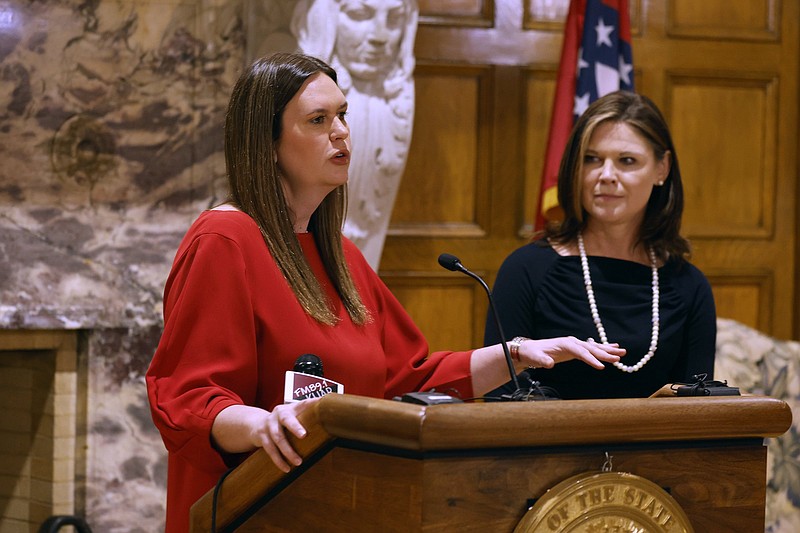The state Department of Human Services is seeking federal approval to require participants in Arkansas' Medicaid expansion program to work, volunteer or enroll in training or classes, Gov. Sarah Huckabee Sanders announced Wednesday.
The new requirement would apply to recipients of the Arkansas Health and Opportunity for Me program, or ARHOME, an expansion that uses Medicaid dollars to buy private health insurance for participants, Sanders said during a news conference.
Unlike the state's previous Medicaid work requirement, ARHOME recipients would not lose Medicaid coverage if they failed to meet the requirement outlined in Sanders' proposal. Instead, their coverage would revert to traditional Medicaid fee-for-service coverage.
"Arkansas is still too far behind in making sure able-bodied citizens are working," the Republican governor said. "We need a clear path for Arkansans to move from government dependency to financial independence."
More than 300,000 adults are enrolled in the ARHOME program. The Medicaid expansion offers coverage to Arkansans with incomes below 138% of the federal poverty level, which corresponds to an annual income of $18,000 for a one-person family, said Kristi Putnam, secretary of the Department of Human Services.
The Department of Human Services plans to publish a draft Medicaid waiver amendment April 23 that would remain open for a 30-day public comment period. On June 1, the state expects to submit the waiver amendment to the federal Centers for Medicare and Medicaid Services. State officials are proposing Jan. 1, 2024, as the effective date for the new requirement, Putnam said.
Arkansas became the first state to implement work requirements for a Medicaid expansion in June 2018. More than 18,000 people lost their health coverage while the requirement was in place over nine months. A federal judge blocked the requirement in a 2019 ruling. At the time, the state's Medicaid expansion program was known as Arkansas Works.
Under former President Donald Trump, 13 states received approved work requirements for Medicaid programs. Arkansas was the only state that enacted its requirement and took action against recipients who failed to comply. Other states began instituting requirements but did not cut Medicaid coverage for recipients due the coronavirus pandemic and litigation.
The Centers for Medicare and Medicaid Services under President Joe Biden has finalized the withdraw of waivers from all states that approved work requirements under the previous administration, according to the nonprofit Kaiser Family Foundation.
Sanders said she expects federal officials to approve the state's request. She said the measure was "fully compliant with previous court rulings" and reiterated that it differed from previous work requirements in that it would not lead to Arkansans losing Medicaid coverage.
While several states have instituted various forms of work requirements tied to Medicaid, Department of Human Services spokesman Gavin Lesnick said none has taken the same approach that Sanders has outlined.
When asked about what would incentivize ARHOME participants to fulfill the work requirement, Putnam said the state expansion provides enhanced benefits compared to traditional Medicaid coverage, including additional health and social supports.
Since there is currently no work requirement in effect, state officials are not tracking the number of ARHOME recipients who aren't working, volunteering or taking classes, said Lesnick.
Rep. Lee Johnson, who chairs the House Committee on Public Health, Welfare and Labor, voiced support for the work requirement, saying that boosting the state's labor force was a top priority for officials.
"Anything we can do to address the workforce shortage we're having right now in Arkansas is important. I think it's arguably the most important economic thing we can do," said Johnson, a Republican from Greenwood. "A strategy like this seems to be something that can help alleviate some of those concerns."
Senate minority leader Greg Leding, D-Fayetteville, said that while work requirements for Medicaid programs may be politically popular, he doesn't believe they are effective. A better approach to growing the workforce, he said, would be for state officials to focus on providing Arkansans access to better transportation, stable housing and social support networks.
"People aren't just choosing not to work," Leding said Wednesday.
Harvard researchers in a 2020 analysis found that Arkansas' previous work requirement did not increase employment among 30-to-49 year-olds -- the demographic targeted by the policy -- when compared to states without work requirements.
When asked about studies that showed work requirements were ineffective, Sanders said "the goal always has to be to encourage people to get into the workforce and not be fully dependent on the government."
The number of hours an ARHOME participant would have to work, volunteer or take classes per month under the requirement has yet to be determined. State officials will address specifics of the program as they develop the draft amendment for public comment, Lesnick said in an email Wednesday.
Continuous coverage requirements for states' Medicaid programs are set to phase out starting April 1 under the federal public health emergency. Recipients who are no longer eligible or do not respond to renewals may start losing coverage then even if the federal emergency is continued.
"We estimate between 15 and 30 percent of Medicaid recipients who have had their coverage extended because of the Public Health Emergency (PHE) and who are in categories outside of the Long Term Services and Supports (LTSS) populations may be disenrolled," Lesnick said.
The department, however, won't know precisely how many Arkansans will be impacted until it completes the unwinding process and redetermines eligibility for the affected recipients. This process will be completed within six months of April 1.
The total enrollment in Medicaid at the end of 2022 was 1,143,219, Lesnick said.
